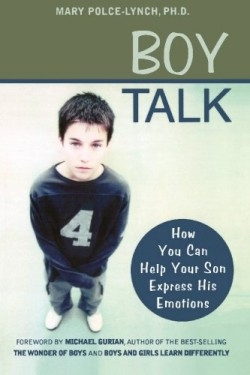Boy Talk
How You Can Help Your Son Express His Emotions
Boys’ emotional health should be nurtured from birth—but it’s never too late to start, according to the author, a Ph.D. and practicing psychotherapist.
One of the biggest hurdles for boys is what Polce-Lynch calls the “Pack Rules.” Pack Rules include not crying, bragging about sexual conquests, and abhorring homosexuality, she writes, and attention to these “rules” begins as early as toddlerhood, when boys are discouraged from crying after a fall. Rather than scolding a sobbing three-year-old, she says, pick him up and soothe him. Actions like this help nurture a boy’s emotions and set the foundation for good mental health as he grows.
Polce-Lynch, who is assistant director for the Center for Counseling and Career Planning at Randolph-Macon College in Virginia, where she teaches psychology of gender, also espouses “mirroring,” or explaining a boy’s feelings back to him, as in: “I imagine you were very scared when that happened.”
Naming emotions and helping a boy realize that he has experienced them is one of the most important steps, she writes, but simply listening to boys is the best way to help their emotional growth. The author offers case studies from her own practice in which the patient became easier to deal with once he had a name for what he was feeling and felt comfortable discussing it. Too often, she writes, the Pack Rules dictate that boys shouldn’t feel fear or grief or embarrassment-and shouldn’t talk about them, either.
Polce-Lynch recommends building boys’ empathy by empathizing with them, validating their emotions, frequently talking about how other people feel, teaching the difference between caring about another person’s feelings and taking on that other person’s problems, modeling empathy directly, and modeling empathy indirectly, by saying things like: “Samuel was really nice to Joshua.”
Polce-Lynch also addresses “the wimp factor” and maintains that boys won’t become sissies just because they feel and acknowledge their emotions. She cites examples in pop culture, including recent movies such as the Cuba Gooding role in Jerry Maguire, where an emotional man is a pivotal and respectable character. Our culture doesn’t back this up very often, she writes, but she stresses that “honoring boys’ feelings doesn’t create wimps; it creates humans.”
While the book is aimed mainly at parents, it also features advice for therapists, teachers, and even mentors.
Disclosure: This article is not an endorsement, but a review. The publisher of this book provided free copies of the book to have their book reviewed by a professional reviewer. No fee was paid by the publisher for this review. Foreword Reviews only recommends books that we love. Foreword Magazine, Inc. is disclosing this in accordance with the Federal Trade Commission’s 16 CFR, Part 255.

